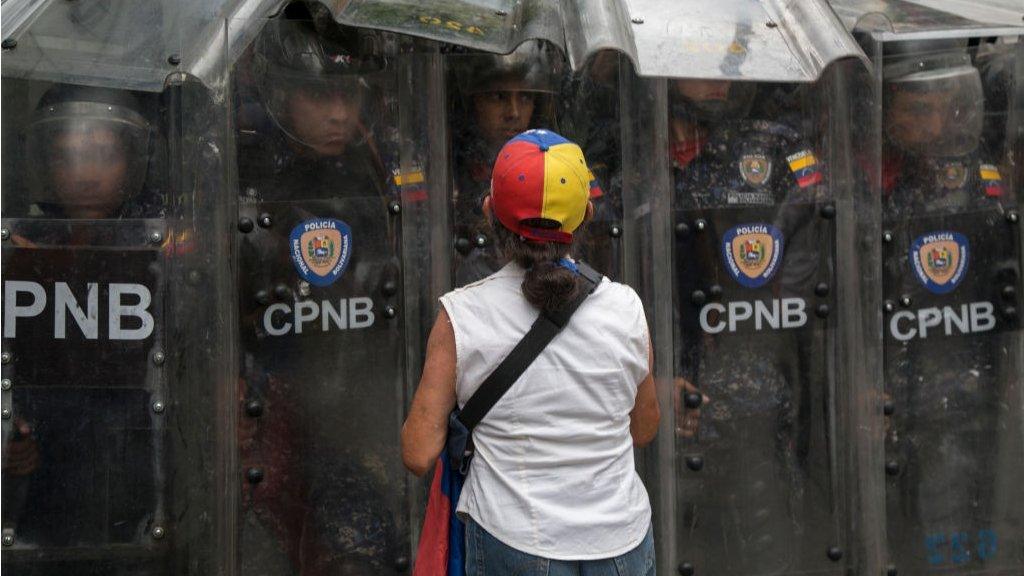Venezuela crisis: Defiant Maduro claims victory over Guaidó 'coup'
- Published
Opposition leader Juan Guaidó is appealing to the military for support
Venezuela's President Nicolás Maduro says he has defeated an "attempted coup" by opposition leader Juan Guaidó.
Dozens of National Guardsmen sided with the opposition in clashes on Tuesday that injured more than 100 people.
But in a defiant TV address, President Maduro said Mr Guaidó had failed to turn the military against him.
Mr Guaidó insists that Mr Maduro has lost control of the armed forces. The opposition leader called for more streets protests on Wednesday.
"Today we continue," he tweeted. "We will keep going with more strength than ever, Venezuela."
Mr Guaidó has been recognised as interim leader of Venezuela by more than 50 countries, including the US, the UK and most in Latin America.
The US reiterated its support for Mr Guaidó on Wednesday, with Secretary of State Mike Pompeo saying "military action is possible" if necessary.
But Mr Maduro, backed by Russia, China and the top of the country's military, has refused to cede leadership to his rival.
Mr Pompeo is scheduled to speak with Russia's Foreign Minister Sergei Lavrov on Wednesday, National Security Adviser John Bolton said.
What did Mr Maduro say?
In his televised address, flanked by military commanders, Mr Maduro accused protesters of "serious crimes" which he said would "not go unpunished".
Both the president and Mr Guaidó have called on their supporters to take to the streets, setting up more potential violent unrest in a nation already beset by economic crisis, chronic power cuts and widespread food shortages.
Venezuela's President Nicolás Maduro defiant in speech
Mr Maduro lashed out again at the United States, which he accuses of plotting against him. He dismissed a claim by the US that he had a plane ready on the tarmac to take him to Cuba, a staunch supporter of the beleaguered president.
"They had an airplane on the tarmac," Mr Pompeo said. "He was ready to leave this morning [Tuesday], as we understand it. Russians indicated he should stay."
What happened on Tuesday?
A three-minute video by Mr Guaidó published in the early hours of Tuesday showed him standing alongside a number of men in military uniform. He announced that he had the support of "brave soldiers" in the capital, Caracas.
He urged Venezuelans to join them in the streets, and appeared alongside another opposition leader, Leopoldo López, who had been under house arrest since 2014.
"This is unstoppable," says Carlos Vecchio, Juan Guaido's envoy to the US
Supporters on both sides then gathered in different places of Caracas throughout the day, and there were clashes between Mr Guaidó's supporters and armed military vehicles.
Protesters were also seen throwing rocks, but being repelled by tear gas and water cannon. At one stage a military vehicle was filmed driving into protesters.
Mr Guaidó, the president of the opposition-controlled National Assembly, has called on Venezuela's military to back him ever since he declared himself interim president in January.
He argues that President Maduro is a "usurper" because he was re-elected in polls that had been widely disputed.
Tuesday marked the most violent episode of the Venezuelan political crisis this year. Venezuelan health officials said 69 people were injured in the clashes, including two with bullet wounds.
Broadcasts from a number of news agencies, including the BBC and CNN, were apparently suspended amid the violence.
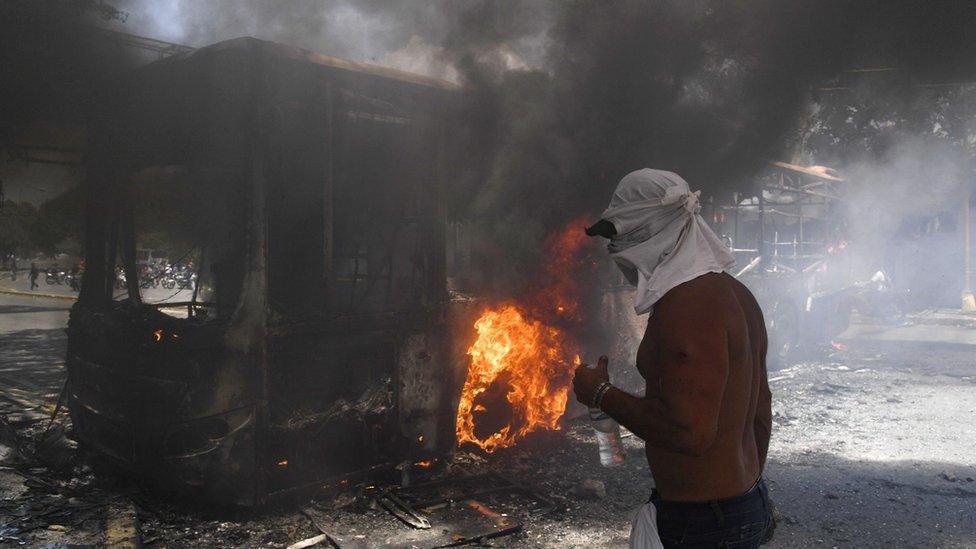
An opposition demonstrator stands next to a burned out bus in Caracas
Later on Tuesday, it emerged Mr López had sought safety in the Chilean, then the Spanish embassy, along with his family.
The US Federal Aviation Administration (FAA) issued an emergency prohibition against all US carriers flying below 26,000ft in Venezuelan airspace.
It also said all US operators should leave the country within 48 hours, due to increasing political instability.


One sidebar to the Venezuela story is the battle for influence between the US and Russia. It's a battle that, for now at least, Russia seems to be winning.
US Secretary of State Mike Pompeo was quick to accuse Russia of meddling, insisting that its government had persuaded President Maduro to abandon plans to flee to Havana.
While the US has firmly backed the Venezuelan opposition leader Russia has thrown its weight behind Mr Maduro - vetoing a US resolution calling for fresh Venezuelan elections and offering considerable practical assistance - medicines, grain supplies and unspecified military support.
Russia's support for Venezuela has been long-standing. And it's not just a matter of strategic rivalry with Washington, corporate interests in Moscow and individuals close to President Putin have large stakes in Venezuela's oil industry.

How did the international community react?
UN Secretary General António Guterres has appealed for both sides to avoid violence.
The US reiterated its support for Mr Guaidó. In a television interview on Wednesday, Mr Pompeo said Washington would prefer a peaceful transition of power but stated that "military action is possible".
"If that's what's required, that's what the United States will do," the US Secretary of State said.
President Donald Trump said he was monitoring events in Venezuela "very closely" and said the US stood with the Venezuelan people and their freedom.
He also threatened to implement the "highest-level sanctions" and a "full and complete embargo" against Cuba unless its military immediately ceased its support of Mr Maduro.
Governments who still support Mr Maduro, including Bolivia and Cuba, condemned Mr Guaidó's efforts as an attempted "coup d'etat".
The Mexican government expressed "concern about a possible increase in violence" while Colombian President Ivan Duque urged the Venezuelan military to stand "on the right side of history" against Mr Maduro.
An emergency meeting of the Lima Group of Latin American countries has been scheduled for Friday.

- Published28 January 2019
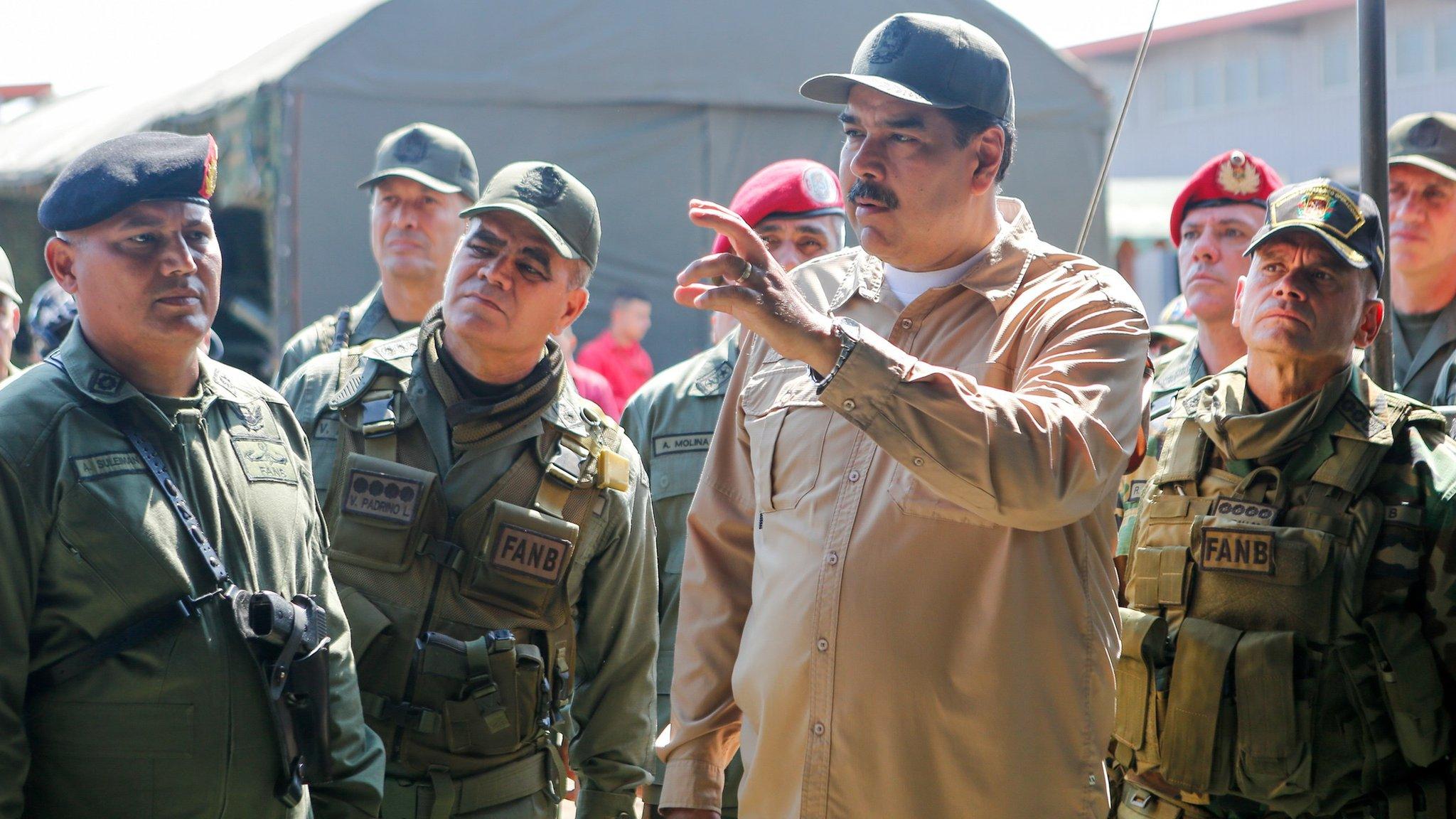
- Published17 April 2019
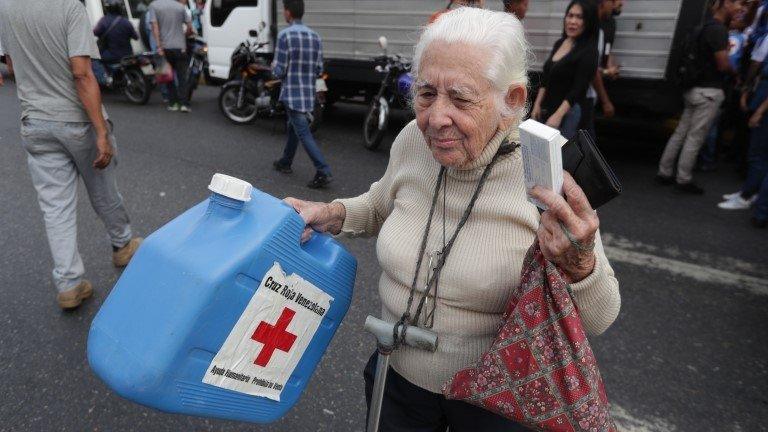
- Published30 April 2019
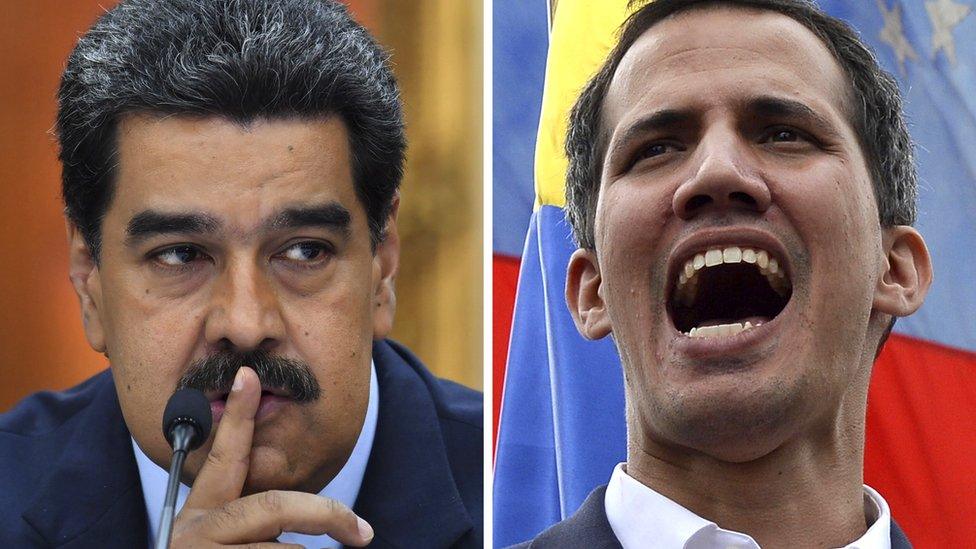
- Published12 August 2021
